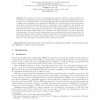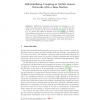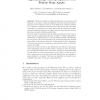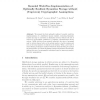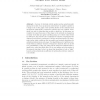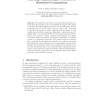105
click to vote
WDAG
2007
Springer
15 years 8 months ago
2007
Springer
We consider the problem of minimizing the number of ADMs in optical networks. All previous theoretical studies of this problem dealt with the off-line case, where all the lightpat...
WDAG
2007
Springer
15 years 8 months ago
2007
Springer
Abstract. Distributed computing must adapt its techniques to networks of mobile agents. Indeed, we are facing new problems like the small size of memory and the lack of computation...
126
click to vote
WDAG
2007
Springer
15 years 8 months ago
2007
Springer
Abstract. Weak fairness guarantees that if an action is continuously enabled, it is executed infinitely often. Strong fairness, on the other hand, guarantees that actions that are...
126
click to vote
WDAG
2007
Springer
15 years 8 months ago
2007
Springer
We study adaptive routing algorithms in a round-based model. Suppose we are given a network equipped with load-dependent latency functions on the edges and a set of commodities eac...
WDAG
2007
Springer
15 years 8 months ago
2007
Springer
107
click to vote
WDAG
2007
Springer
15 years 8 months ago
2007
Springer
Consider a distributed network of n nodes that is connected to a global source of “beats”. All nodes receive the “beats” simultaneously, and operate in lock-step. A scheme ...
107
click to vote
WDAG
2007
Springer
15 years 8 months ago
2007
Springer
We present the first optimally resilient, bounded, wait-free implementation of a distributed atomic register, tolerating Byzantine readers and (up to one-third of) Byzantine serve...
WDAG
2007
Springer
15 years 8 months ago
2007
Springer
A group of identical mobile agents moving asynchronously among the nodes of an anonymous network have to gather together in a single node of the graph. This problem known as the (a...
119
click to vote
WDAG
2007
Springer
15 years 8 months ago
2007
Springer
Abstract. We examine the problem of detecting nested temporal predicates given the execution trace of a distributed program. We present a technique that allows efficient detection ...
113
click to vote
WDAG
2007
Springer
15 years 8 months ago
2007
Springer
Many recommend planning for the worst and hoping for the best. In this paper we devise efficient indulgent consensus algorithms that can tolerate crash failures and arbitrarily lo...
